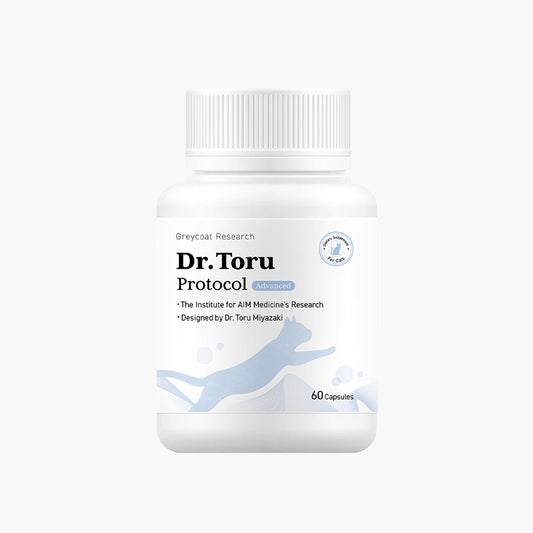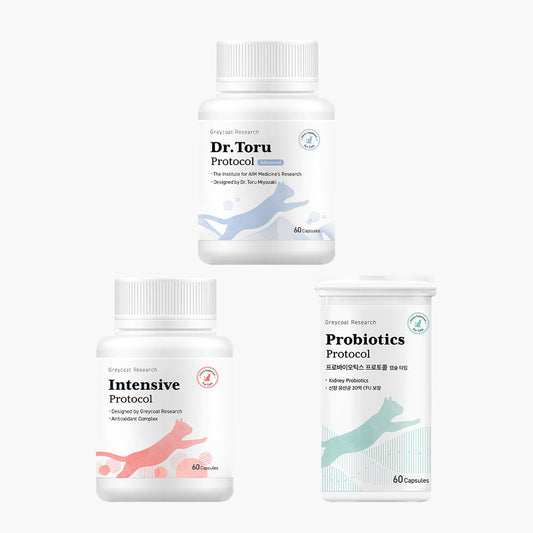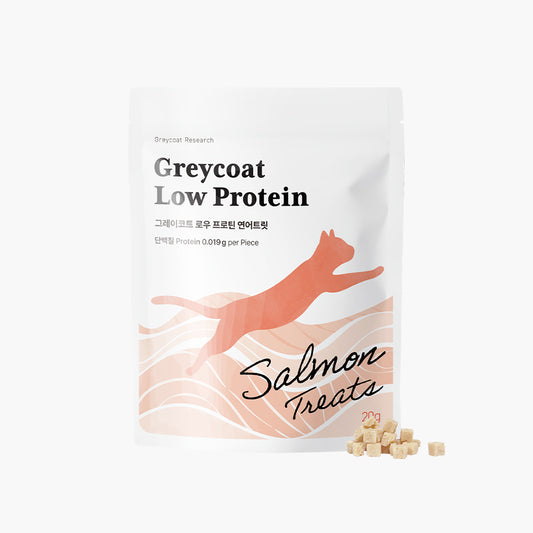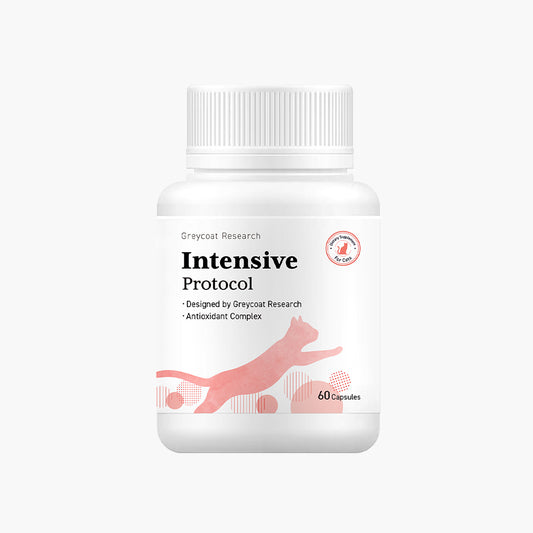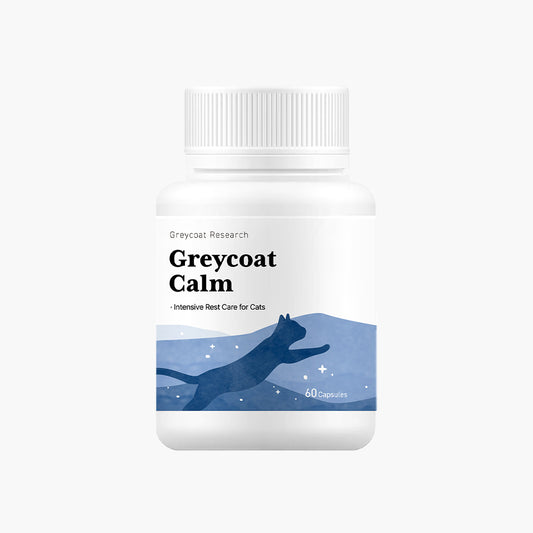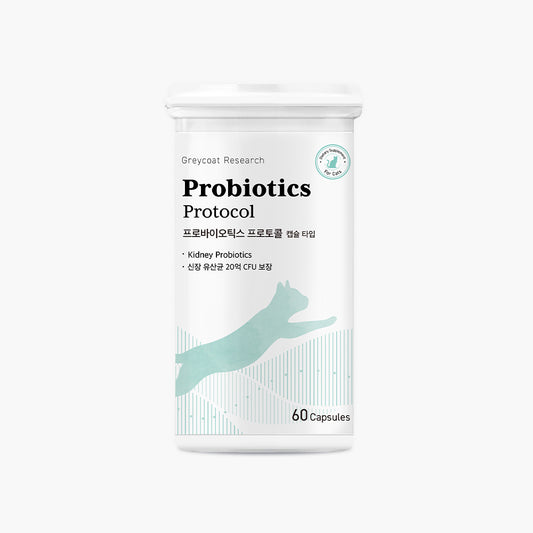
Bei Greycoat Research verwenden wir Resveratrol sowohl im Dr. Toru Protocol als auch im Intensive Protocol – nicht nur wegen seiner antioxidativen Eigenschaften, sondern weil es eine wichtige Rolle für die Darm- und Nierengesundheit spielen könnte.
Diese Überzeugung basiert sowohl auf praktischer Erfahrung in der Katzenpflege als auch auf zunehmender wissenschaftlicher Unterstützung.

Dr. Toru Protocol (links) und Intensive Protocol (rechts)
Eine kürzlich in der International Journal of Medical Sciences veröffentlichte Studie untersuchte, wie Resveratrol dazu beiträgt, die Darmschleimhaut bei chronischer Nierenerkrankung (CKD) zu erhalten.
CKD betrifft häufig nicht nur die Nieren – sie kann auch Probleme im Darm verursachen.
Die Studie ging der Frage nach, ob Resveratrol, eine natürlich in Trauben, Beeren und Erdnüssen vorkommende Verbindung, die Darmschleimhaut vor Schäden schützen kann, die durch die Ansammlung von Abfallstoffen bei CKD entstehen.

Warum das für die CKD-Pflege bei Katzen wichtig ist
Viele Katzen mit Nierenerkrankungen leiden zusätzlich unter Erbrechen, Appetitlosigkeit oder Durchfall.
Diese Symptome könnten mit Schäden an der Darmschleimhaut in Zusammenhang stehen.
Die Studie deutet darauf hin, dass Resveratrol in solchen Fällen dazu beitragen könnte, den Darm zu schützen – und macht diesen Inhaltsstoff damit zu einem interessanten Faktor in der Nierenpflege für Katzen.
Studiendesign und experimentelle Modelle
Diese Originalstudie verwendete sowohl in vivo- als auch in vitro-Methoden:
- In Vivo: Ein 5/6-Nephrektomie-Mausmodell wurde eingesetzt, um CKD zu simulieren. Nach der Induktion der Nierenschädigung wurden die Mäuse mit Resveratrol behandelt.
- In Vitro: IEC-6-Darmepithelzellen wurden mit Indoxylsulfat exponiert, um zelluläre Reaktionen mit und ohne Resveratrol-Behandlung zu beobachten.

Histologische Beurteilung der Darmmorphologie bei CKD-Mäusen mit und ohne Resveratrol-Behandlung
Zentrale Ergebnisse
1. Störung von Tight-Junction-Proteinen (TJPs)
Die Exposition gegenüber Indoxylsulfat führte zu einer reduzierten Expression wichtiger Tight-Junction-Proteine, darunter ZO-1, Occludin, Claudin-1 und Claudin-2.
Dies weist auf eine beeinträchtigte Integrität der intestinalen Barriere hin – ein typisches Merkmal der CKD-assoziierten Darmfunktionsstörung.

Expression von Tight-Junction-Proteinen (TJPs) in IEC-6-Zellen unter Indoxylsulfat-Exposition mit und ohne Resveratrol
2. Beeinträchtigte Mitophagie und erhöhte Apoptose
Indoxylsulfat (IS) hemmte die autophagische Entfernung beschädigter Mitochondrien und förderte den apoptotischen Zelltod in IEC-6-Zellen.
Western-Blot-Analysen zeigten veränderte Expressionsniveaus von LC3, P62 sowie eine erhöhte Spaltung von Caspase-3 (cleaved caspase-3).

Veränderung von Mitophagie-Markern in IEC-6-Zellen unter Indoxylsulfat- (IS) und Resveratrol- (RSV) Behandlung
3. Schutzwirkung von Resveratrol
Die Behandlung mit Resveratrol stellte die Expression von Tight-Junction-Proteinen (TJP) wieder her, normalisierte Mitophagie-Marker und verringerte die Apoptose sowohl in Maus- als auch Zellmodellen.
4. Mechanistische Signalwege
Regulation der Mitophagie: Resveratrol modulierte die IRF1-DRP1-Signalkaskade, um die Qualitätskontrolle der Mitochondrien zu unterstützen.
Hemmung der Apoptose: Die schützenden Effekte wurden vermittelt über den PI3K/Akt-HO-1-Antioxidansweg sowie die Hemmung des mTOR-Signalwegs.

Western-Blot-Analyse apoptoseassoziierter Proteine
Bedeutung für die Darm-Nieren-Achse und klinische Anwendbarkeit
Die Studie unterstützt die Hypothese, dass der Erhalt der Darmbarriere-Integrität das Fortschreiten von Nierenschäden verlangsamen könnte.
Resveratrol scheint seine Wirkung nicht nur über direkte Mechanismen in den Nieren auszuüben, sondern auch durch den Schutz von Darmepithelzellen vor Schäden durch urämische Toxine.
Obwohl sich diese Forschung auf Nagetiere und Zellmodelle konzentriert, eröffnen die Ergebnisse potenzielle translationale Ansätze für die Behandlung von CKD bei Katzen und Menschen.
Da gastrointestinale Störungen bei CKD-kranken Katzen häufig auftreten, könnten Interventionen zur Stabilisierung der Darmbarriere einen vielschichtigen therapeutischen Nutzen bieten.
Resveratrol in den Nierenpflege-Protokollen von Greycoat Research
Wir sind überzeugt, dass Resveratrol ein wertvoller Bestandteil einer ganzheitlichen Strategie zur Nierenpflege ist – einer Strategie, die nicht nur die Nieren isoliert, sondern das gesamte Krankheitsbild berücksichtigt.
Forschungen wie diese bestätigen, warum wir uns entschieden haben, Resveratrol in unsere Rezepturen aufzunehmen.
Unsere Erfahrung aus über 1.000 individuellen Katzenberatungen hat gezeigt:
Die besten Ergebnisse erzielt man nicht mit einzelnen Wirkstoffen, sondern mit durchdachten, umfassenden Pflegeplänen, die alle relevanten Aspekte von CKD berücksichtigen.
Diese ganzheitliche Herangehensweise steht im Zentrum all unserer Arbeit.
Doch Resveratrol allein reicht nicht aus.
Nierenerkrankungen sind komplex, und kein einzelner Wirkstoff kann den Krankheitsverlauf allein aufhalten. Deshalb sind unsere Formulierungen so konzipiert, dass sie die Nieren aus verschiedenen Blickwinkeln unterstützen – darunter Darmgesundheit, Entzündungsregulation, oxidativer Stress und mehr.
Ebenso wichtig ist die ausgewogene Dosierung jedes einzelnen Bestandteils.
Zu viel kann den Körper überfordern, zu wenig bleibt wirkungslos.
Bei Greycoat Research entwickeln wir jede Ergänzungsformel auf Grundlage eines klaren Prinzips:
Präzision, Ausgewogenheit und gezielte Unterstützung – speziell für Katzen mit chronischer Nierenerkrankung.

